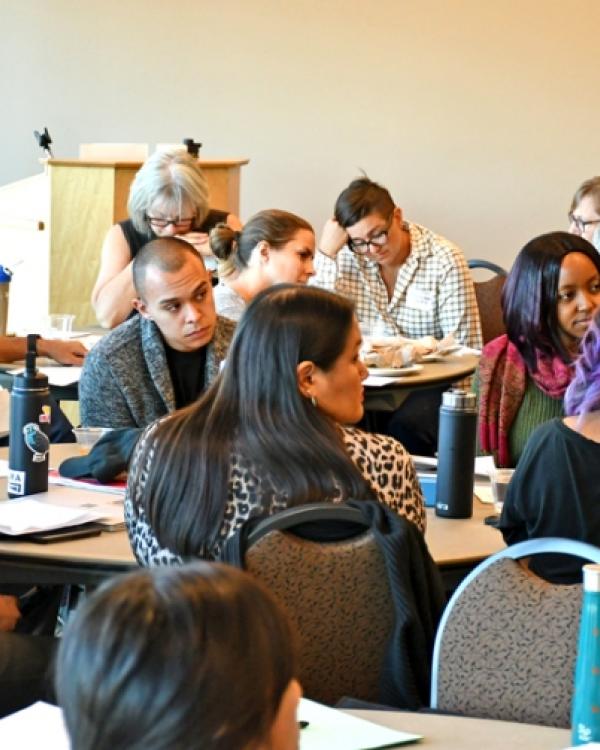
There could seem no better way to cap the UCSB Graduate Division’s 2019 Diversity Matters series last fall than with a presentation featuring the students in Dean Jeffrey Milem’s doctoral seminar in Policy and Leadership entitled Race (In)Equity in Higher Education. The luncheon event, hosted by Dean Milem and Dean of Social Sciences Charles Hale, brought together faculty and staff members from across campus who already have advanced understanding of diversity issues and who wanted to be engaged in further advancing diversity.
What was most striking is the discussion was facilitated by the students in Dean Milem’s course, all doctoral students in the Department of Education. First the group—Ryan Arellano, Isaac Castro, Rodolfo Cerda, Charlene Macharia, Marilyn Monroy Castro, Rachelle Mottus, and Bertin Solis—reflected on their own experiences as students of color in higher education. Then they asked the attendees to answer questions about what they did in their classrooms and as advisors to provide support and inclusion for all students. Finally, they moved the discussion to larger issues, attempting to compile strategies and actions to strengthen equity, diversity, and access on campus.
“An event like this one not only gives the campus a chance to see how much we have accomplished in achieving and sustaining diversity,” Dean Milem says, “but it also lets us see how much more we still have to do. Even better, with a room full of engaged students and committed faculty, we learn how much we can learn from each other. There is so much we can share and then model from.”
One of the more interesting questions addressed in the event asked: “To what extent have advisors and professors built upon your community cultural capital/experiential knowledge/funds of knowledge to facilitate your success in your graduate program?” Ryan Arellano, who is not just working on a HSI project that is a collaboration between the Chicano Studies Institute and the Division of Student Affairs that focuses on assessing student services and ensuring that these services are meeting the needs of all UCSB students, but she is also the lead coordinator of the McEnroe Reading and Language Arts Clinic, put it this way: “In my experience, faculty have taken into consideration that I am from a low-income household and that my multicultural background provides some issues in terms of identity. I have been allowed time to explore my multicultural identity in order to help solidify my own research interests for graduate school. That being said, it has been helpful to also have other faculty that actually share some of the same background in order to show me that it is possible to continue on this path.”
Marilyn Monroy Castro, who came to UCSB having already earned her Master’s in Higher Education, Administration & Leadership at CSU Fresno, put it this way: “I have been very fortunate that my advisor, Dr. Rebeca Mireles-Rios, has given me space and autonomy to explore my research interests since my arrival to the Ph.D. program. Coincidentally, many of the opportunities and research projects that I have partaken in have organically developed around my experiential knowledge and interest in sports. My advisor has made a conscientious decision to allow her advisees to follow paths of research that also interlace with our hands-on job experience. Rather than restricting our research curiosities, she builds on our skills and encourages the development of our research lens through the cultural capital we have gained.”
Always hoping to build on strengths, students were also asked what can advisors and professors do to be more effective building on students existing cultural capital and experiential knowledge? “I think one of the big steps that faculty can take is to simply address race in the first place,” Arellano, who has already earned her MA from the GGSE, adds. “Opening up a conversation allows the student the opportunity to speak about their experiences and personal backgrounds. This helps bridge the kind of relationship needed to build a positive relationship between faculty and student. It is difficult for faculty to build upon funds of knowledge if they don't know anything about their students. Talking about race is uncomfortable for a lot of people, so initiating that conversation is a good start.”
Castro also stresses the importance of team-building within cohorts of students, claiming, “Advisors should be encouraging and supportive of their advisees’ fields of interest and help draw connections between those interests and their ongoing research. In addition to Dr. Mireles-Rios's support, she actively works to get her advisees to collaborate and work with one another. This teamwork mindset is conducive to great collaboration and expansion of past, current, and future research prospects.”